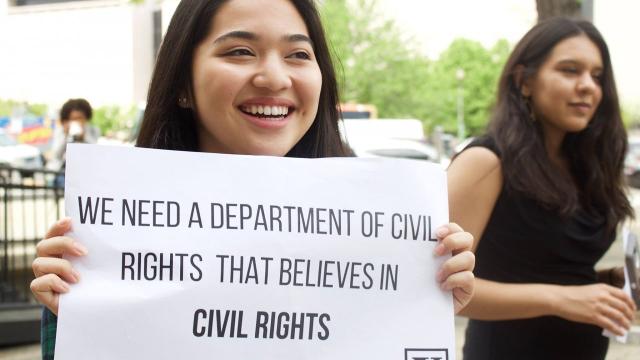
DeVos heavily criticized Obama-era Title IX policies — but activists say those policies protected survivors and held schools accountable. Video provided by Newsy Newslook
DeVos aims to strike balance lacking in cases of college sexual assaults: Our view
For too many years and on too many campuses, sexual assaults were ignored or even covered up, particularly if star athletes were involved. With a shove from the Obama administration in 2011, universities have changed their attitudes and their rules, seeking to confront a crime that many consider an epidemic on campus.
But some colleges have gone too far. They’ve denied students accused of assault even a modicum of the due process rights guaranteed by the Constitution. At many universities, they are not presumed innocent, not promised adequate notice of the charges against them, and denied the right to cross-examine their accusers.
Last Thursday, in a highly anticipated speech, Education Secretary Betsy DeVos vowed to replace “this failed system” with one that will respect the rights of all involved. “Every survivor of sexual misconduct must be taken seriously," DeVos said. "Every student accused of sexual misconduct must know that guilt is not predetermined.”
Though all important details were not released, that is surely the right balance, one that colleges have had a great deal of difficultly striking.
OPPOSING VIEW: Betsy DeVos has it backwards
Sexual assaults are serious crimes best handled by the criminal justice system. The most stringent punishment schools can order is expulsion. That can be appropriate for cheating on a term paper, but not for rape — particularly when some expelled students are serial predators who might strike again on another campus.
At the same time, when universities employ tribunals or other quasi-judicial systems, they have an obligation to follow due process. Victims groups argue that due process is not required in “administrative hearings,” as opposed to criminal cases. But in 1975, the Supreme Court ruled that “where a person's good name, reputation, honor, or integrity is at stake,” minimal requirements of due process "must be satisfied.”
In other words, due process is not some legal technicality. It's a matter of fairness that lies at the heart of America’s justice system.
According to one study, 2% to 10% of rape accusations are false. Some others are alcohol-fueled encounters riddled with uncertainty. Yet under the 2011 policy guidance, an innocent student can be branded as a rapist for life based on the lowest standard of proof, “preponderance of the evidence.”
Since the Obama rules took effect, about 100 students have appealed guilty findings. In about 60 cases, courts have sided with them. In one case detailed in The Atlantic, a University of Massachusetts student accused — and later found not responsible — of a dubious sexual misconduct charge was banned from talking about the case and ultimately hounded from campus.
A better system is clearly needed.
All colleges need a supportive counseling center that is welcoming to students who've been assaulted and can help them go to police and press charges. One intriguing idea DeVos suggested is a place where colleges could refer cases: regional centers with experts who can gather forensic evidence, investigate and work with law enforcementto "facilitate — but never require — criminal prosecutions.”
Until colleges and the federal government can find their way to an improved process for dealing with campus sexual assaults, victims and the accused alike are being sentenced to second-class justice.
USA TODAY's editorial opinions are decided by its Editorial Board, separate from the news staff. Most editorials are coupled with an opposing view — a unique USA TODAY feature.
No comments:
Post a Comment